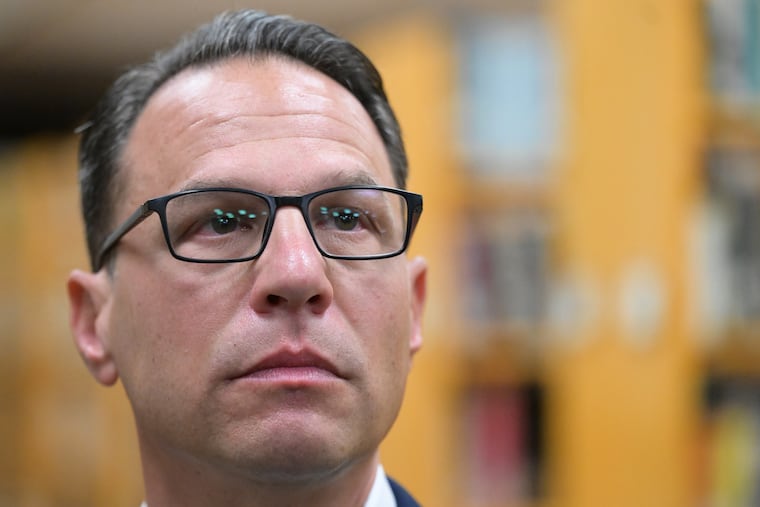Josh Shapiro has had big ambitions for a long time. His 1986 bar mitzvah was an early clue.
As a boy, Shapiro carried himself with “a special dignity that is reflective of a young man with a purpose, a goal," his rabbi said of the future Pennsylvania governor at his bar mitzvah.

One spring day in 1986, Josh Shapiro became a bar mitzvah. Rabbi Aaron Landes told the packed congregation at Beth Sholom Synagogue in Elkins Park that there was something special about the boy.
Joshua, Rabbi Landes said, carried himself with “a special dignity that is reflective of a young man with a purpose, a goal.”
Thirty-eight years later, that young man still has a big vision. Shapiro, Pennsylvania’s governor, could be named Vice President Kamala Harris’ running mate this week, catapulted onto an international stage.
In a way, it’s the next step in a journey that Shapiro has been preparing for since he was a child growing up in Dresher, Montgomery County.
‘Children for Avi’
A May 27, 1986, Inquirer story detailed the bar mitzvah of “Joshua, a dark-haired boy” whose coming-of-age ceremony was particularly notable because of a guest who was present: Avi Goldstein, 12.
Shapiro and Avi had been pen pals since the American boy was 6 years old. Avi and his family were “refuseniks,” Soviet Jews denied the right to emigrate to Israel. Avi’s father, physicist Isai Goldstein, tried for 14 years to leave the Soviet Union.
The Goldsteins were persecuted because they were Jewish, The Inquirer reported. Their apartment was searched and their relatives sent to prison.
The Goldsteins, who lived in the town of Tbilisi, the capital of what is now Georgia, educated their son at home after second grade, but eventually sent him back to school at age 11.
Avi was first beaten until he suffered a concussion, then after school officials promised his family they would keep him safe, he was attacked again — classmates grabbed him, removed his clothes, and took a picture of his circumcised penis, The Inquirer reported.
Shapiro, who learned about the Goldsteins from his synagogue and school, Forman Hebrew Day School, had written faithfully to Avi. But in 1985, he spearheaded a letter-writing campaign — “Children for Avi” — with participants from the U.S., Canada and England. The aim was to get national attention to the family’s plight.
After Avi was attacked for the second time at school, the family again appealed to authorities. In February, Sen. Edward M. Kennedy announced that Soviet leader Mikhail Gorbachev agreed to let 25 Soviet Jews, including the Goldsteins, leave the country.
In May 1986, Avi and Shapiro stood side-by-side at Beth Sholom as Josh became a bar mitzvah.
Avi only spoke a few words of English, and until his visit to the United States, his father told The Inquirer in 1986, he had never seen a Torah. At his friend’s ceremony, Avi chanted a blessing in Hebrew.
Avi sat with Shapiro, who had corresponded faithfully over the years, writing every month.
Shapiro’s letters “were full of details about the life of an American boy,” the 1986 Inquirer story said. “Avi’s letters, probably the victims of a Soviet censor, never made it to Joshua’s house. But messages were smuggled out of the Soviet Union to the Dresher boy, Avi’s father said.”
Shapiro, in his bar mitzvah speech, said he had lost hope that Avi would be let go in time to celebrate his bar mitzvah.
“I thought I would have to symbolically share this with him,” Shapiro said in his speech.
Though he was delighted that the Goldsteins had finally been allowed to leave, the 13-year-old future governor took a big-picture view: His work was not done, he said.
Shapiro said in his bar mitzvah speech that he continued to worry about “thousands of other [Jewish] children still enslaved in the Soviet Union.”
An evolution on Israel
Shapiro’s activism on behalf of Avi Goldstein was formative, he has said.
In 2022, he told The Forward that “these are memories that probably have led me into this life of service.”
Later, when he was a student at the University of Rochester in 1993, Shapiro wrote in his college newspaper that he believed peace “will never come” in the Middle East and that Palestinians were “too battle-minded” to coexist with Israel.
A spokesperson for Shapiro told The Inquirer the governor’s views have evolved in the 30 years since then. He now supports a two-state solution in the Middle East.
Shapiro, along with Arizona Sen. Mark Kelly and Gov. Tim Walz of Minnesota, is a front-runner to be the Democratic vice presidential nominee. He met with Harris in Washington this weekend.
Harris has announced she will make her first public appearance with her vice presidential pick Tuesday in Philadelphia, at the Liacouras Center on Temple University’s campus.